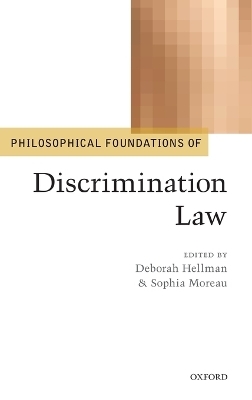
Philosophical Foundations of Discrimination Law
Seiten
2013
Oxford University Press (Verlag)
978-0-19-966431-3 (ISBN)
Oxford University Press (Verlag)
978-0-19-966431-3 (ISBN)
Exploring the philosophical foundations of discrimination law as it exists in several jurisdictions, this collection of all new essays bridges the gap between abstract philosophical work on justice and fairness and legal work on specific types of discrimination.
How do we understand and justify the particular partialities that discrimination law tries to protect against? Are different discrimination laws from around the world grounded in a single set of norms? And does discrimination law fail to treat people as individuals?
The philosophical study around discrimination law in the private and public sector is a relatively young field of inquiry. This is owing to the fact that anti-discrimination laws are relatively new. It is arguably only since the Second World War that these rights have been adopted by countries in a broad sense, ensuring that all citizens have civil rights and the right to non-discrimination. Theory around discrimination law has until recently been threefold, doctrinal in its approach, questioning equality - why it matters and why should it influence legislatures in the design of policy - and thirdly focusing on the issue of affirmative action.
This volume takes a fresh look at the philosophy of discrimination law, identifying points of discussion in need of further study. It addresses how we are to understand and justify laws prohibiting discrimination. For instance, how discrimination might be best conceived - as a personal wrong or as an unfair distribution of resources. The volume then turns to a number of meta-theoretical questions, whether different discrimination laws are coherent and grounded in collectively held beliefs or are instead a collection of very different rules that have no underlying coherence. Lastly, the authors focus on issues in discrimination law that are currently the topic of considerable political debate. The questions raised here are urgent and necessary and it is the hope of the authors that other academics and philosophers may join in their discussions.
How do we understand and justify the particular partialities that discrimination law tries to protect against? Are different discrimination laws from around the world grounded in a single set of norms? And does discrimination law fail to treat people as individuals?
The philosophical study around discrimination law in the private and public sector is a relatively young field of inquiry. This is owing to the fact that anti-discrimination laws are relatively new. It is arguably only since the Second World War that these rights have been adopted by countries in a broad sense, ensuring that all citizens have civil rights and the right to non-discrimination. Theory around discrimination law has until recently been threefold, doctrinal in its approach, questioning equality - why it matters and why should it influence legislatures in the design of policy - and thirdly focusing on the issue of affirmative action.
This volume takes a fresh look at the philosophy of discrimination law, identifying points of discussion in need of further study. It addresses how we are to understand and justify laws prohibiting discrimination. For instance, how discrimination might be best conceived - as a personal wrong or as an unfair distribution of resources. The volume then turns to a number of meta-theoretical questions, whether different discrimination laws are coherent and grounded in collectively held beliefs or are instead a collection of very different rules that have no underlying coherence. Lastly, the authors focus on issues in discrimination law that are currently the topic of considerable political debate. The questions raised here are urgent and necessary and it is the hope of the authors that other academics and philosophers may join in their discussions.
Deborah Hellman is Professor of Law at the University of Virginia School of Law. She is the author of 'When is Discrimination Wrong?' (Harvard U. Press, 2008). Prior to joining the University of Virginia law faculty, Hellman taught at the University of Maryland School of Law Sophia Moreau is Associate Professor of Law and Philosophy at the University of Toronto. Professor Moreau is working on a book manuscript which elaborates a liberty-based account of why discrimination is wrong, for which she holds a SSHRC grant from the Government of Canada.
PART I: WHAT MAKES DISCRIMINATION WRONG? ; PART II: PROBLEMS OF CONSTRUCTING A THEORY OF WRONGFUL DISCRIMINATION ; PART III: THEORETICAL LESSONS DERIVED FROM PRACTICE
| Erscheint lt. Verlag | 28.11.2013 |
|---|---|
| Reihe/Serie | Philosophical Foundations of Law |
| Verlagsort | Oxford |
| Sprache | englisch |
| Maße | 162 x 235 mm |
| Gewicht | 608 g |
| Themenwelt | Geisteswissenschaften ► Philosophie |
| Recht / Steuern ► Allgemeines / Lexika | |
| Recht / Steuern ► Arbeits- / Sozialrecht ► Arbeitsrecht | |
| Recht / Steuern ► EU / Internationales Recht | |
| Recht / Steuern ► Öffentliches Recht ► Verfassungsrecht | |
| Sozialwissenschaften ► Politik / Verwaltung | |
| ISBN-10 | 0-19-966431-5 / 0199664315 |
| ISBN-13 | 978-0-19-966431-3 / 9780199664313 |
| Zustand | Neuware |
| Haben Sie eine Frage zum Produkt? |
Mehr entdecken
aus dem Bereich
aus dem Bereich
mit den wichtigsten Bestimmungen zum Arbeitsverhältnis, …
Buch | Softcover (2024)
dtv Verlagsgesellschaft
CHF 19,45
Tarifrecht öffentlicher Dienst : Textausgabe
Buch | Softcover (2024)
dtv Verlagsgesellschaft
CHF 33,45


